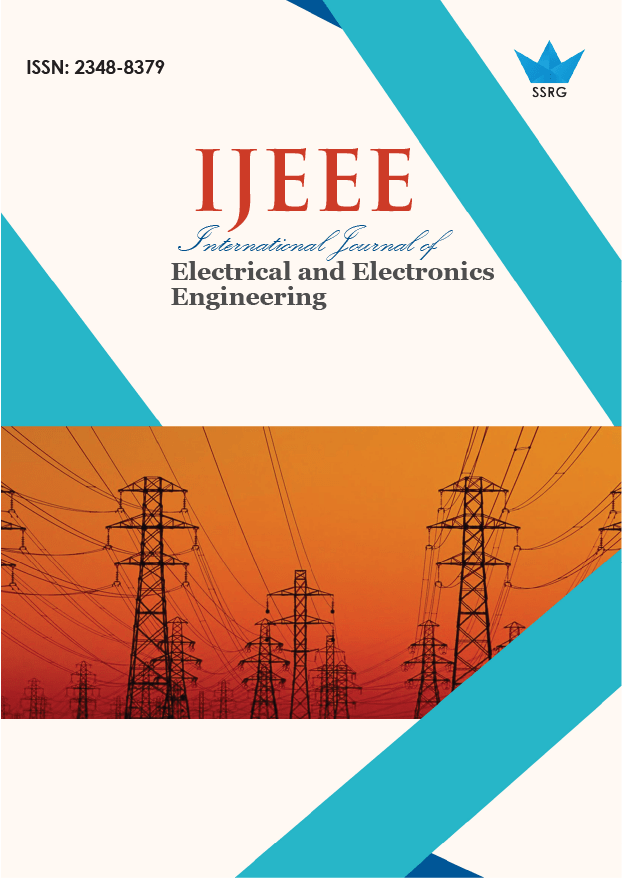Study of FACTS Controllers and its Impact on Power Quality

| International Journal of Electrical and Electronics Engineering |
| © 2018 by SSRG - IJEEE Journal |
| Volume 5 Issue 6 |
| Year of Publication : 2018 |
| Authors : Pulakesh Kumar Kalita and Dr.Satyajit Bhuyan |
How to Cite?
Pulakesh Kumar Kalita and Dr.Satyajit Bhuyan, "Study of FACTS Controllers and its Impact on Power Quality," SSRG International Journal of Electrical and Electronics Engineering, vol. 5, no. 6, pp. 34-40, 2018. Crossref, https://doi.org/10.14445/23488379/IJEEE-V5I6P106
Abstract:
for last couple of decades the demand for electrical power has increased manifold and as we have limited resources of power generation, it results into heavy loading of the transmission line which leads to stability, voltage sag/swell and reactive power issues. Application of FACTS controllers in a power system is a promising and more efficient way for transfer and control of a bulk amount of power. This paper focuses on voltage dependency on reactive power and control of the same for improvement in the power quality. A comparative analysis of steady-state power flow control of a power system transmission network using FACTS controllers namely SVC, STATCOM and TCSC are performed. The performance of these FACTS controllers in the control of power flow on given test bus system is analyzed. Voltage magnitude is compared for shunt connected controllers to analyze the efficiency. Reactance modeling and power injection modeling techniques are used to incorporate the FACTS controllers into Newton Raphson load flow algorithm. Numerical results on a benchmark 5 bus test system with incorporation of each of the FACTS controllers are presented
Keywords:
Power Quality, Voltage control, Reactive Power, FACTS, SVC, STATCOM, TCSC
References:
[1] R. Sastry Vedam, Mulukutla S. Sarma, "Power quality VAR compensation in power system”, ISBN: 13: 978-1-4200-6480-3.
[2] K.R.PADIYAR, “FACTS controllers in power transmission and distribution”, new age international (p) limited publisher, ISBN (13): 978-81-224-2541-3
[3] B.Viswanath, K. Revathi, T. R. Jyothsna, "FACTS Controllers for Enhancement of Power System Performance: State-of-the-art”, International Journal of Pure and Applied Mathematics Volume 114 No. 8 2017, 265-273
[4] Roger C.Dugan, Mark F.McGranagham, Surya Santoso, H.Wayne Beaty, “Electrical power systems quality”, third edition
[5] Gerard Ledwich, Arindam Ghosh, “POWER QUALITY ENHANCEMENT USING CUSTOM POWER DEVICES” ISBN 978-1-4613-5418-5
[6] N. Mahdavi Tabatabali, Ali Jafari Aghbolaghi, N. Bizon, Freek Blaabjerg, “Reactive power control in AC power systems”
[7] R. Mathur, R. Varma, Thyristor-based FACTS controllers for electrical transmission systems, IEEE, 2002.
[8] N.G.Hingorani , "Flexible AC transmission" IEEE Spectrum, v.30, n.u., pp.40-44,1993
[9] N.G.Higngorani and L.gyugui, Understanding FACTS-Concepts and technology of flexible AC transmission systems, IEEE
[10] J.Vithayathil, C. Taylor, M, Klinger and W. Mittelstadt, “Case Studies of Conventional and Novel Methods of Reactive Power Control on AC Transmission Systems”, CIGRE, SC 38-02, 1988
[11] Sujatha Subhash, B.N. Sarkar and K.R. Padiyar, “Sensitivity based determination of suitable locations for controlled series compensation for enhancement of steady-state stability in a large power system", IFAC Symposium on “Control of Power Systems and Power Plants”, Beijing, August 1997.
[12] Aishvarya Narain, S.K. Srivastava, “An overview of FACTS devices used for reactive power compensation Techniques”, IJERT, vol 4, issue 12, December 2015.
[13] L. Gyugyi, "A Unified Power Flow Controller concept for flexible AC transmission systems", IEE Proceedings-C, v. 139, n.4, 1992, pp. 323-331Key Words:

 10.14445/23488379/IJEEE-V5I6P106
10.14445/23488379/IJEEE-V5I6P106